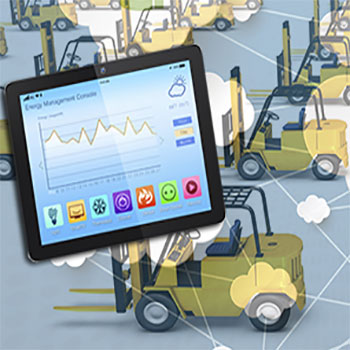The Internet of Things Impact on Fleet Management

Rapid improvement suggests the lift truck could be among the most important things in the Internet of Things.
Let’s have a round of applause for fleet management.
In a relatively short time, solutions from impact sensors to telematics have advanced the industry to the point that about 25% of the market uses telematics integrated through mounted or mobile computers.
Along the way, growth in the use of warehouse control systems (WCS) and a push for real-time responsiveness elevated the role of on-board computers.
While the “sophisticated” work took place there, fleet management was initially a much simpler art with plenty of room for improvement.
Now, however, the fleet management “layer” has climbed the ladder and enjoys equal footing and full integration with wider software and optimization solutions.
In fact, an argument could be made that fleet management is toward the top of the pack in terms of its potential to improve safety, cut costs, boost productivity, and enable flexibility and nimbleness.
The Internet of Things (IoT) is, at its most basic, the ability to connect things, and lift trucks are pretty important in that network.
“Lift trucks were just a dirty part of the business, and a guy could stand on one if he was successful at other menial jobs in the building,” says Mike Maris, senior director of North American transport and logistics for Zebra Technologies.
Borrowing from the successes of over-the-road fleet management, lift truck systems gather telematics about the driver’s performance and the condition of the engine so little problems don’t get bigger.
“Inside the four walls,” Maris says, “the questions include: ‘What’s my battery life? Will it last a full shift or part? Am I driving hard, lifting more, and how fast?’”
Unlike a tractor trailer driver, however, a lift truck operator is likely to exit the vehicle frequently to perform other tasks. “Understanding what is going on in the building, including real-time location systems (RTLS), ties into not just the warehouse management system, but the WCS,” Maris says. “If you see all of a sudden you have a bunch of putaways in one area, and there’s a traffic jam, the WCS can redirect an operator to avoid congestion.”
In the old paradigm, lift truck staff dynamics are like a Battle of the Bands, where training issues and seasonal peaks and valleys hit hard.
The new paradigm is instead very much like an orchestra, where a lift truck operator can interact with nearby equipment and systems or automatically trigger an action by proximity.
“Before, the conveyor systems might have been in sync with inbound and outbound flow, but the lift trucks and pickers were variables,” Maris says. “Now, we can program what the day will be like based on standardization, or we can quickly adjust to keep pace with volume. This market will evolve very quickly.”
Related: Enter the Smart (Internet of Things) Warehouse

Article Topics
Zebra Technologies News & Resources
Autonomous mobile robots (AMRs) offer modern solution to challenges of traditional farming Data Capture: Bar coding’s new companions Zebra Technologies introduces wearable computers Data Capture: Bar coding’s new friends Retail distribution closes in on the customer Enhance Your 3PL Operations in 2024 with the Latest Technology Solutions Automatic data capture (ADC): Accelerating the process More Zebra TechnologiesLatest in Warehouse|DC
Talking Supply Chain: Supply chain’s watchdog Ranking the World’s 10 Biggest Supply Chains The Top 10 Risks Facing Supply Chain Professionals Walmart’s Latest Service: Ultra Late-Night Delivery Dollar Tree’s Oklahoma Distribution Center Decimated by Tornado European Parliament Passes Law on Supply Chain Accountability Transforming Warehousing with AI: Five Key Reasons to Adopt Now More Warehouse|DCAbout the Author















